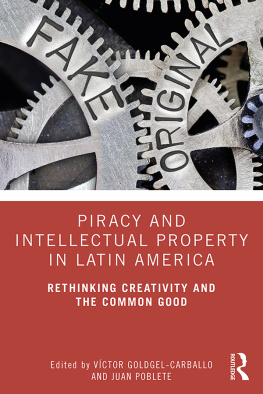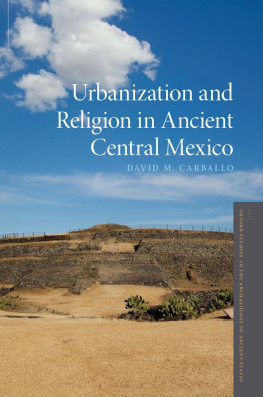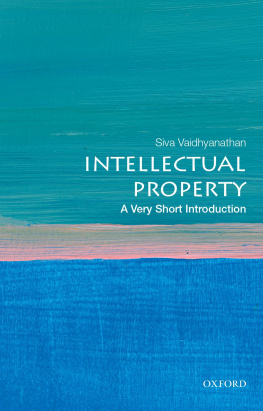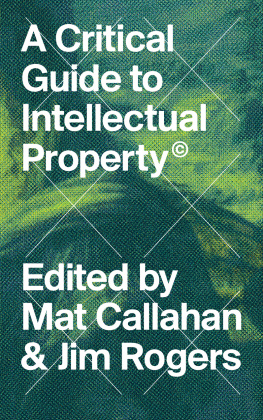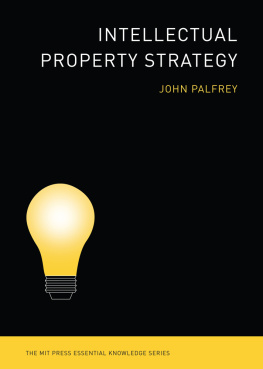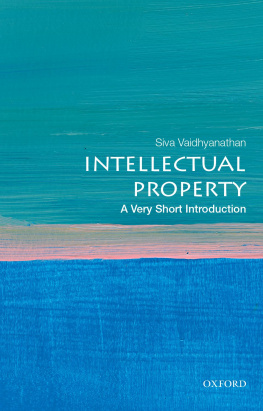Piracy and Intellectual Property in Latin America
Piracy and Intellectual Property in Latin America is the first sustained effort to present an alternative framework for understanding piracy and contemporary challenges to global discourses on intellectual property (IP) in the Americas.
While piracy might just look like theft and derivative reproduction from the perspective of many right-holders, the contributors to this volume go beyond this economic-driven logic and show how practices of copying are in fact practices of reinvention that reflect the rich social networks and forms of creativity, authorship, commerce, and consumption that characterize informal economies. From a perspective informed by contemporary scenarios in Mexico, Brazil, Chile, Argentina, Peru, Guatemala, and the United States, they engage in a discussion of alternatives thatpredicated on the importance of protecting cultureallow for other ways of conceiving prosperity at local, national, regional, and global levels. Examples discussed include video games, clothing, trinkets, music, film, TV, and books.
Designed to help understand the broader implications of IP and piracy for the field of Latin American studies, this book will be a major contribution to Global South studies, as well as to the growing bibliography on globalization, informal markets, and piracy.
Vctor Goldgel-Carballo is an Associate Professor in the Department of Spanish and Portuguese at the University of Wisconsin-Madison.
Juan Poblete is Professor of Latin/o American Literature and Cultural Studies at the University of California Santa Cruz.
The essays in this collection expertly localize unauthorized use in Latin America, integrating on-the-ground production with globalizing discourses of circulatory legitimacy. The book should be required reading for those interested in the increasingly important role of digital textuality in emerging economies.
Alexander S. Dent,Associate Professor of Anthropology, The George Washington University
First published 2020
by Routledge
52 Vanderbilt Avenue, New York, NY 10017
and by Routledge
2 Park Square, Milton Park, Abingdon, Oxon OX14 4RN
Routledge is an imprint of the Taylor & Francis Group, an informa business
2020 Taylor & Francis
The right of Vctor Goldgel-Carballo and Juan Poblete to be identified as the authors of the editorial material, and of the authors for their individual chapters, has been asserted in accordance with sections 77 and 78 of the Copyright, Designs and Patents Act 1988.
All rights reserved. No part of this book may be reprinted or reproduced or utilised in any form or by any electronic, mechanical, or other means, now known or hereafter invented, including photocopying and recording, or in any information storage or retrieval system, without permission in writing from the publishers.
Trademark notice: Product or corporate names may be trademarks or registered trademarks, and are used only for identification and explanation without intent to infringe.
Library of Congress Cataloging-in-Publication Data
A catalog record for this title has been requested
ISBN: 978-0-367-42401-5 (hbk)
ISBN: 978-0-367-42399-5 (pbk)
ISBN: 978-0-367-82395-5 (ebk)
Vctor dedicates this book to all the people whose unpaid labor makes books and sharing knowledge possible.
Juan dedicates this book to the memory of his beloved father-in-law, Joe Mahay (19462019): a great bushwhacking Adirondack environmental pioneer, and a better person.
We are grateful to our contributors for their patience, kindness, and professionalism and to each other por la muy buena onda. It has been a pleasure. We would also like to thank the participants in the Latin American Studies Association workshops on piracy cultures that we organized in New York and Lima in 2016 and 2017. Natalja Mortensen and Charlie Baker, our great editors at Routledge, generously welcomed this project and gave us valuable guidance in this long process. Thanks too are due to the editorial team at Routledge for the material production of this book, and to Richelle Wilson for her help with the preliminary editing of some of the chapters. Vctor would like to thank Cristian De Npoli, Guadalupe Salomn, and Damin Ros for their interest in piracy and their invaluable comments, as well as Sarah Ann Wells for her insights on the theoretical dimensions of this project. As usual Juan wants to thank Micah Perks, without whom, nothing.
Rosana Pinheiro-Machado is a lecturer of international development at the Department of Social and Policy Sciences at the University of Bath. Previously, she was a lecturer at the Department of International Development at the University of Oxford and held visiting positions at the University of So Paulo and Harvard University. She is the author of Counterfeit Itineraries in the Global South (Routledge, 2017) and Made in China (Hucitec, 2011). Funded by the Australian Research Council, she is part of a team that investigates new consumer practices in the Global South. Pinheiro-Machado is also a columnist for The Intercept (Brasil).
Kedron Thomas is Associate Professor of Anthropology at Washington University in St. Louis. She is the author of Regulating Style: Intellectual Property Law and the Business of Fashion in Guatemala (University of California Press, 2016) and co-editor of Securing the City: Neoliberalism, Space, and Insecurity in Postwar Guatemala (Duke University Press, 2011). Her current research examines policy, practice, and debate regarding labor ethics and environmental sustainability along globalized fashion and footwear supply chains.
Phillip Penix-Tadsen is Associate Professor of Spanish and Latin American Studies at the University of Delaware. He holds a PhD from Columbia University and is a specialist in Latin American cultural studies, focusing on the intersections between politics, economics, new media, and visual culture in the region today. His first book, Cultural Code: Video Games and Latin America (MIT Press, 2016), offers a synthetic theorization of the relationship between video games and culture through case studies related to Latin America. Professor Penix-Tadsen is also the editor of the anthology Video Games and the Global South (ETC Press, 2019).
Santiago Alfaro Rotondo is a sociologist and Professor at the Pontificia Universidad Catlica del Per (PUCP). He is the author of many articles and book chapters, including: Peruwood: la industria del video digital en el Per (LARR, 2013), La msica andina como mercado de consumo (PUCP, 2015), and Crecimiento con desigualdad: brechas y retos de la economa de las industrias culturales y creativas del Per (Universidad Miguel Hernndez, 2018, co-authored). His research areas include cultural policies, ethnicity, and the economics of cultural and creative industries. He has also been the deputy manager of performing arts and cultural industries at the Metropolitan Municipality of Lima and general director of cultural industries and arts at the Ministry of Culture.
Jennifer Ashley is Assistant Professor of Global Affairs at George Mason University. She has a PhD in Anthropology from Brown University. Her work focuses on media and political subjectivity and has been published in journals such as American Ethnologist, Popular Communication

